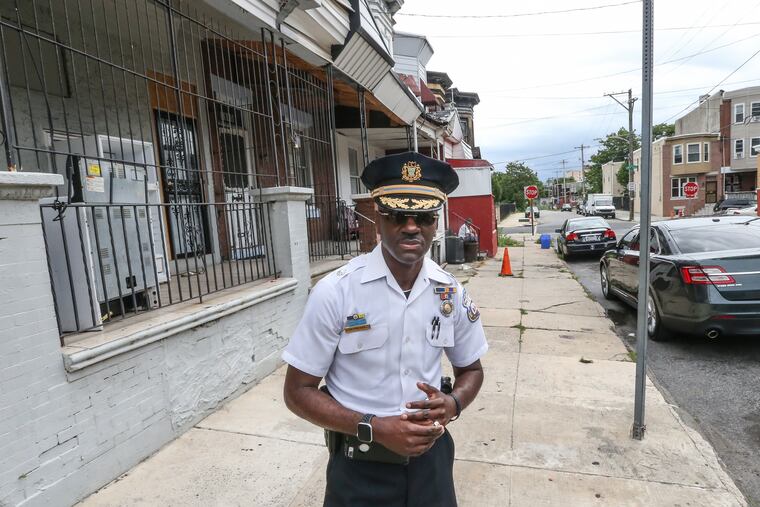In the Northwest Philly neighborhood where he grew up, a police inspector reckons with rising gun violence | Mike Newall
In a neighborhood where gunmen hide in the tall grass of overgrown lots, a police commander returns home to stem the violence.

When Police Inspector DeShawn Beaufort of the Northwest Division pulled up on Collum Street off Germantown Avenue on Tuesday, he was met immediately by neighbors pointing at a lot choked with weeds and wildflowers as tall as a man.
On any other block, the tall grass would be a quality-of-life issue, as the cops would say. On Collum Street, it’s life or death.
Gunmen hide among the wildflowers, the neighbors told the inspector.
Maurice Burch passed by with his brother, Kenneth, who was shot five times last August when gunmen jumped from the lot and opened fire at someone down the street. “I’m lucky to be alive,” Kenneth said.
Maurice said he was glad his brother was still with him – knowing that if Kenneth had died, he would have to go after the men who did it.
“I don’t want to do wrong, but if something happened to my brother, I got to go at him,” he said.
On Collum, the inspector — a trim, soft-spoken black man — recalled a young man he’d talked to the week before near the Olney Transportation Center.
“Someone just shot at him on the corner,” the inspector said, “and he didn’t leave. He wasn’t shook up at all.”
Beaufort took it as another opportunity to try to intercede in the violence that tears at his division – which is home to the most shooting victims in the city, and where this summer I’m reporting on gun violence.
“What bothers me is if I see young brothers dying for nothing — a bag of weed or whatever little beef they have,” the inspector told the young man. “This has to stop. We’re burying you guys.”
The kid assured the inspector that that wasn’t lost on him and his friends. They have those same conversations, he said.
“But if we stop, the other crew won’t,” the young man said.
Like the tall weeds, it was a matter of life and death.
These are the conversations that Inspector Beaufort, 41, has around the division he has lived and worked in for nearly his entire life. He views them as like a savings account. A good interaction with a neighbor is a deposit. A bad interaction or, worse, police misconduct, is a withdrawal. The point is to try to build up enough savings that when the withdrawal happens, it doesn’t bankrupt you. And withdrawals are going to happen.
Like with the Facebook scandal — 72 officers so far have been temporarily reassigned after a Buzzfeed and Injustice Watch investigation found hundreds of racist or otherwise offensive Facebook posts.
“It ticks you off,” Beaufort said. “It’s like you take one step ahead, 10 steps back, and then we have to go back and work that much harder to keep improving on the relationship we’re trying to build.”
It helps that he’s trying to build relationships in the place he’s called home for so long. He split time between his childhood home in Mount Airy with his parents — Marion, a printer, and Ester, a factory worker, both from South Carolina — and his grandmother’s house on Somerset Street on the southern border of the division.
The Dobbins High School grad never saw himself as a cop. Not after the beatings and mistreatment he said he witnessed at the hands of police. It was the mid-'90s, the height of the 39th District police scandal, when a half-dozen officers from the division he now commands pleaded guilty to robbing, framing, and beating citizens.
“Those are the officers we would see,” he said. “I hated cops. Couldn’t stand them.”
But a cop’s paycheck could provide a college education.
“I thought about it — ‘If I do it, I can make a difference,’” he recalled. “If I can help change the perception or culture of hard-core policing, then that’s a good thing.”
What a heavy thing for a 19-year-old to take upon himself.
The young man who became a cop to make a difference is now trying to police the city’s toughest division, where he’s seeing more gun arrests than ever — and balancing that gargantuan task with the reforms that might finally right the wrongs he saw as a child.
And all this is taking place in a time when ducking bullets is a part of residents’ routines. Like on Collum Street earlier this year.
“If we put an officer up the street, they shot down the street,” the inspector said. “We put them down the street, they shot up the street. We walk around, they wait until the officers are on the next block.”
With an added police presence, the shootings have finally quieted.
And on Tuesday, the inspector promised he’d make a phone call about the weeds. Another small deposit in the account.